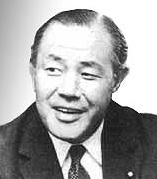Difference between revisions of "Yoneji Masuda"
Caseorganic (Talk | contribs) |
Caseorganic (Talk | contribs) |
||
| (6 intermediate revisions by the same user not shown) | |||
| Line 1: | Line 1: | ||
| − | [[ | + | [[Image:yoneji-masuda-information-society.jpg|150px|right]] |
===Biography=== | ===Biography=== | ||
| − | Yoneji Masuda | + | Yoneji Masuda (1905-1995) was a Japanese sociologist whose early ideas on information and communication helped him become known as the "Father of the Information Society". His professional and academic activity played a crucial role in the strategic definition of a model for Japan technological society promoted public policy at the time was one of the pioneers in conceptualizing the idea of information society.<ref>From http://en.wikipedia.org/wiki/Yoneji_Masuda translated from the Spanish version into an English article for Wikipedia by Caseorganic.</ref> He is best known for his book "The Information Society as Post Industrial Society. |
| − | === | + | ===The Information Society=== |
| − | + | In 1974, a society of Japanese futurists proposed a billion dollar digital society plan called "The Information Society" as post-industrial society. They believed that society could not continue to sustain itself if it relied on consumption and waste as top social and economic values. The project was tested in various households and included two-way communication systems that allowed users of the system to choose images to be displayed on their television screens as well as the ability to receive text messages by TV. | |
| − | + | Educational programs where students could learn from the screen were tested as well. A database which digitally handled emergency calls was also tested, and it worked. This was an experimental internet. It was highly favored by those inside and outside of Japan, and it's proposed cost was in the billions of dollars. | |
| + | Fourth Stage - Individual Based Computerization. "At this stage there will be a personal terminal in each household, used to solve day-to-day problems and determine the direction of one's future life"<ref>Masuda, Yoneji. The Information Society as Post-Industrial Society. World Future Society. Bethesda, MD. 1980. First US Printing 1981. Pg 39.</ref> | ||
| + | |||
| + | Masuda outlined the The Societal Impact of the Information Epoch into the following three stages: | ||
| + | |||
| + | Stage 1- In which technology does work previous done by man. | ||
| + | |||
| + | Stage 2- in which technology makes possible work that man has never been able to do before. | ||
| + | |||
| + | Stage 3 - in which the existing social and economic structures are transformed into new social and economic systems.<ref>Ibid.</ref> | ||
| + | |||
| + | ===Publications=== | ||
| + | Masuda, Yoneji. The Information Society as Post-Industrial Society. World Future Society. Bethesda, MD. 1980. First US Printing 1981. | ||
| + | |||
| + | ==References== | ||
| + | <references /> | ||
| + | |||
| + | [[Category:People]] | ||
| + | [[Category:Book Pages]] | ||
| + | [[Category:Unfinished]] | ||
__NOTOC__ | __NOTOC__ | ||
Latest revision as of 04:11, 15 August 2012
Biography
Yoneji Masuda (1905-1995) was a Japanese sociologist whose early ideas on information and communication helped him become known as the "Father of the Information Society". His professional and academic activity played a crucial role in the strategic definition of a model for Japan technological society promoted public policy at the time was one of the pioneers in conceptualizing the idea of information society.[1] He is best known for his book "The Information Society as Post Industrial Society.
The Information Society
In 1974, a society of Japanese futurists proposed a billion dollar digital society plan called "The Information Society" as post-industrial society. They believed that society could not continue to sustain itself if it relied on consumption and waste as top social and economic values. The project was tested in various households and included two-way communication systems that allowed users of the system to choose images to be displayed on their television screens as well as the ability to receive text messages by TV.
Educational programs where students could learn from the screen were tested as well. A database which digitally handled emergency calls was also tested, and it worked. This was an experimental internet. It was highly favored by those inside and outside of Japan, and it's proposed cost was in the billions of dollars.
Fourth Stage - Individual Based Computerization. "At this stage there will be a personal terminal in each household, used to solve day-to-day problems and determine the direction of one's future life"[2]
Masuda outlined the The Societal Impact of the Information Epoch into the following three stages:
Stage 1- In which technology does work previous done by man.
Stage 2- in which technology makes possible work that man has never been able to do before.
Stage 3 - in which the existing social and economic structures are transformed into new social and economic systems.[3]
Publications
Masuda, Yoneji. The Information Society as Post-Industrial Society. World Future Society. Bethesda, MD. 1980. First US Printing 1981.
References
- Jump up ↑ From http://en.wikipedia.org/wiki/Yoneji_Masuda translated from the Spanish version into an English article for Wikipedia by Caseorganic.
- Jump up ↑ Masuda, Yoneji. The Information Society as Post-Industrial Society. World Future Society. Bethesda, MD. 1980. First US Printing 1981. Pg 39.
- Jump up ↑ Ibid.
